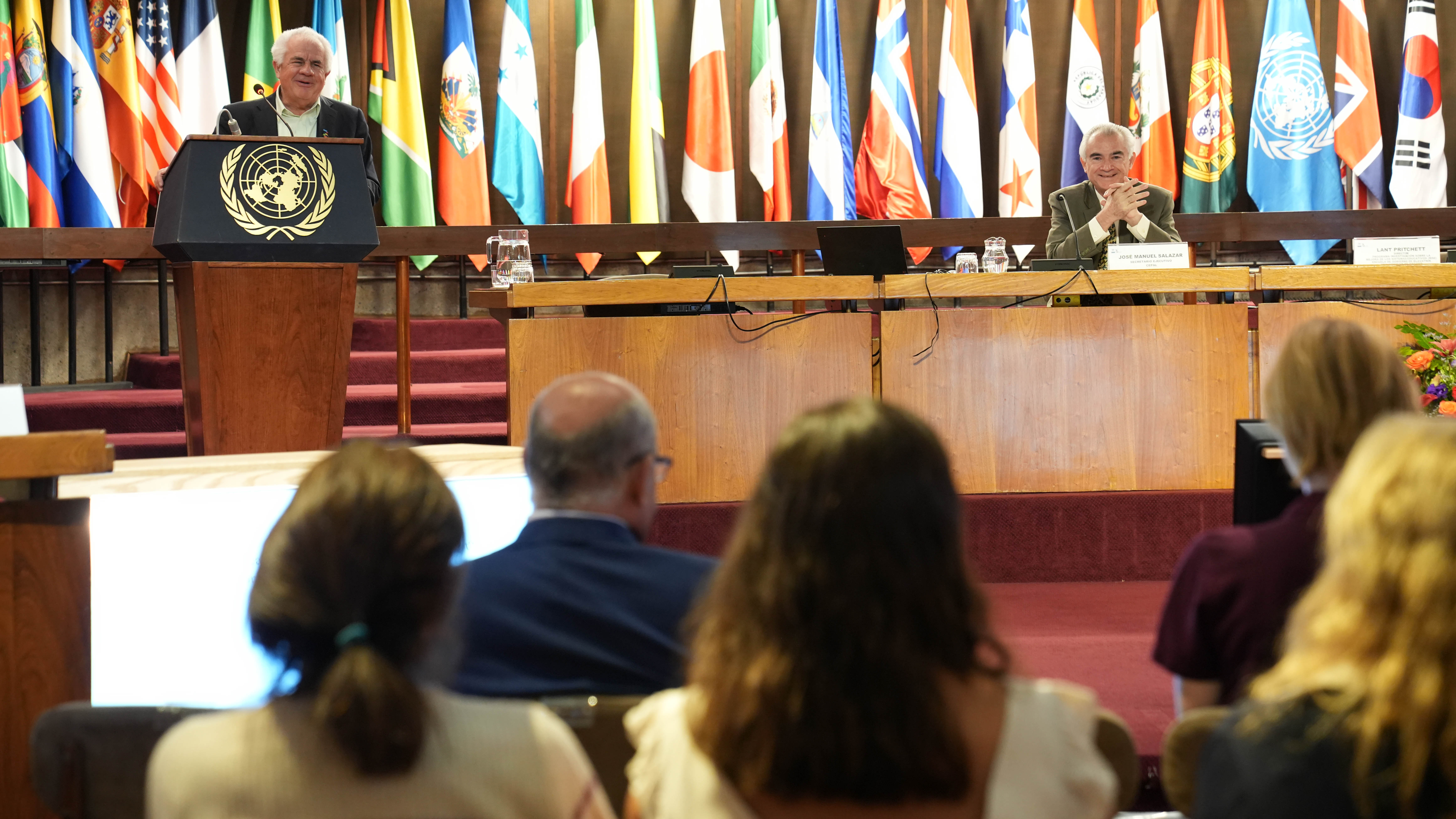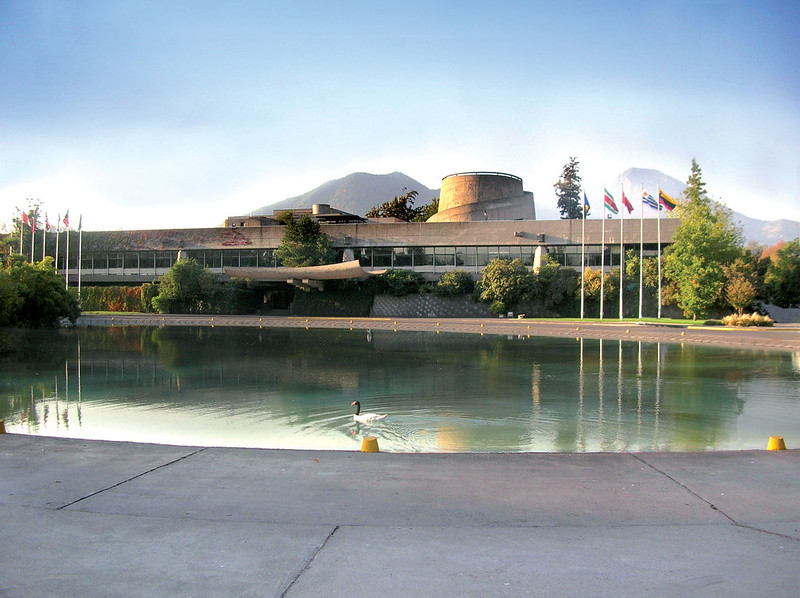Lant Pritchett, a Development Economist from the University of Oxford, Analyzed at ECLAC Education Policies for Achieving Transformative Growth
The renowned U.S. scholar was the ninth and final speaker to participate in the Keynote Lecture Series organized to commemorate the United Nations regional organization’s 75th anniversary.

“For education systems to yield better results, they must be aligned not only with schooling rates but also learning outcomes,” Lant Pritchett, a development economist and former Research Director of the Research on Improving Systems of Education (RISE) programme at the University of Oxford’s Blavatnik School of Government, affirmed during a keynote lecture he gave at the main headquarters of the Economic Commission for Latin America and the Caribbean (ECLAC) in Santiago, Chile.
“If we want schooling to produce more education in order to sustain the kind of productive, inclusive and sustainable growth that ECLAC is looking towards in the future, we need to rethink the way the schooling system works,” declared the renowned U.S. scholar, who was received by ECLAC’s Executive Secretary, José Manuel Salazar-Xirinachs.
Pritchett, a PhD holder in Economics from the Massachusetts Institute of Technology (MIT) and visiting professor at the School of Public Policy of the London School of Economics and Political Science, gave a presentation entitled ”When does education drive growth and when does it not? Education policies for transformative growth,” which was the ninth and final such presentation in the Keynote Lecture Series organized to commemorate ECLAC’s 75th anniversary.
In this lecture, Pritchett stated that growth of output per worker and the percentage growth of schooling are just not correlated.
He noted that in Latin America and the Caribbean, schooling increased more quickly than in “high growth” countries, but the region had growth of output per worker that was less than half as rapid. In other words, he said, the region’s lagging growth cannot be attributed to a slow expansion of schooling.
“Human capital is important to economic growth, but schooling did not produce enough skills to be productive human capital. Inclusive growth with productive transformation will require large improvements in learning outcomes,” he explained.
Pritchett stressed that the problem is not so much the “inclusion” of students by socioeconomic status as the low quality of what they are included into, adding that in low-performing countries, even advantaged students from the socioeconomic elite have very poor learning outcomes.
“What these low levels on PISA-like assessments imply is that students are often completely unable to apply even what skills they have to novel situations, which is probably the most important part of education for a productive worker,” he affirmed.
In his presentation, the prominent scholar laid out five actions needed to put every country’s education system on a path to universal early foundational learning: commit to it; measure learning regularly, reliably and relevantly; align systems around learning commitments; support teaching; and adapt what you adopt as you implement.
Meanwhile, in his welcome remarks, José Manuel Salazar-Xirinachs, ECLAC’s Executive Secretary, pointed up the keynote lecture series organized over the last nine months to celebrate the Commission’s 75th anniversary.
He noted that the series was composed of a total of nine lecturers who addressed issues as diverse as globalization’s process of transformation and its implications for the region, given by Arancha González; needed reforms to the international financial architecture, which was addressed by José Antonio Ocampo; and the challenges of financing needed investment in climate change adaptation and resilience, one of the topics covered by Aloizio Mercadante.
“We also addressed the main challenges for the region’s growth, including new perspectives on economic complexity and productive development, by Ricardo Hausmann; the particular challenges faced by the Caribbean, as per Winston Dookeran; the links between productive development policies and social protection, by Santiago Levy; the issue of migration, aporophobia and ethical challenges for humanity, by Adela Cortina; along with the future of democracy in a digital and artificial intelligence age, by Daniel Innerarity,” he specified.
ECLAC’s highest authority emphasized that the lecturers, topics and focuses were deliberately selected to bring new ideas, to incorporate critical and innovative perspectives, to enrich the repertory of ideas and knowledge that informs the Commission’s work, and to obtain new tools to ensure the quality, relevance and timeliness of the organization’s work in the coming years and decades.
“Today we conclude this very rich and productive series, and I am pleased to say that we will conclude with a final flourish (…) The work of Lant Pritchett is relevant to ECLAC’s work, organized around the ‘ten gaps’ in development and the challenges of governance and of building technical, operational, policy and foresight-related institutional capacities in the public sector,” he underscored.
ECLAC was founded in 1948 as one of the United Nations’ five regional commissions. In the context of its 75th anniversary commemorations, the organization will publish, in late March, a special issue of the CEPAL Review that will address the region’s development challenges along with the major transformations that lie ahead for the region’s countries in their development models and how to manage them.
Related content
Conferencia magistral de Lant Pritchett, economista del desarrollo de la Universidad de Oxford
Palabras de José Manuel Salazar-Xirinachs, Secretario Ejecutivo de la CEPAL.

ECLAC Celebrates 75 Years with a Commitment to Continue Working for a More Productive, Inclusive and Sustainable Future for Latin America and the Caribbean
The United Nations regional organisation, which has a variety of commemorative activities planned throughout the year, launched a website that explains its origins, the evolution of its thinking and…

Ciclo de conferencias del 75° aniversario de la CEPAL
Tenemos el honor de invitarle a la serie de conferencias magistrales de pensadores prominentes que se realizarán en 2023 y 2024, convocadas en el marco de la conmemoración del 75° aniversario de la…
Related link(s)
Country(ies)
- Latin America and the Caribbean
Contact
Public Information Unit
- prensa@cepal.org
- (56 2) 2210 2040
